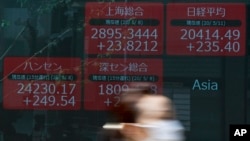U.S. markets posted losses at the closing Tuesday, with no end to the COVID-19 pandemic in sight.
The Dow Jones Industrial Average was down 1.89%, or 457 points, to end at 23,764.
The Nasdaq was down more than 2%, or close to 190 points, closing at 9,002, as was the S&P 500, which ended at 2,870 after losing 60 points.
European markets recorded mostly losses at the end of trading Tuesday.
London’s FTSE 100 index closed up 1%, while the DAX in Frankfurt dipped slightly at 0.05%. The CAC 40 in Paris ended down 0.39%.
Asian markets sustained significant losses earlier Tuesday amid growing concerns over a second wave of the coronavirus outbreak. Hong Kong lost 1.45% of its value by the closing bell, and the Nikkei was down 0.12%. The indexes in Sydney and Taipei were both down just over 1%. Tokyo, Seoul and Shanghai were all slightly lower.
The price of the U.S. benchmark West Texas Intermediate crude is $26 per barrel, a gain of 1.7%, while Brent crude, the international benchmark, is trading at $30.15 per barrel, up 1.7%.
Consumer prices drop
U.S. consumer prices declined for the second straight month in April, according to the Bureau of Labor Statistics. The steady drop is led by the falling prices of oil and energy. The demand for oil has seen a record decline, with people forced to stay at home, while the growing jobless rate and closure of stores pushed sales to an unprecedented low.
Economists warn that falling prices could cause deflation, which they say would be very bad news for manufacturers. It could force them to stop producing goods and lay off workers, adding to the unemployment rates.
Although economies around the world are beginning to reopen, experts say U.S. markets will have a tough time making a full recovery if coronavirus testing isn’t improved.
